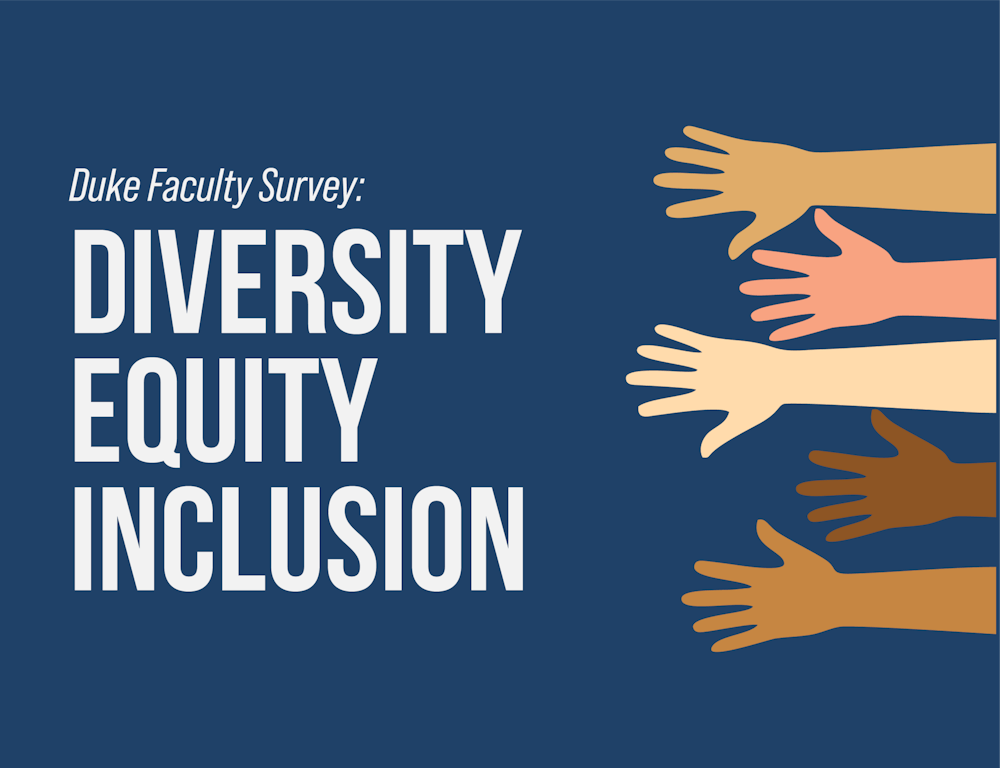Editor's note: This story is part of a series based on a survey of Duke faculty conducted by The Chronicle from April 8 to 19. You can read more about our methodology and limitations here, or read all of our survey coverage here.
For its first year, The Chronicle surveyed Duke faculty members about their thoughts on the University’s diversity, equity and inclusion efforts.
We found that faculty members had varied views on DEI, with nearly half of respondents indicating that Duke placed too much or somewhat too much emphasis on it. Tenured faculty respondents were more likely than others to share this perspective, as were more conservative respondents.
Recent tension around DEI in higher education
In recent years, DEI initiatives have become increasingly politicized, facing attacks nationwide from conservative activists and Republican politicians. These initiatives have become particularly vulnerable following the Supreme Court’s June 2023 ruling overturning race-based affirmative action.
In the wake of the ruling, Duke discontinued its Reginaldo Howard Memorial Scholars Program, which provided full-ride merit scholarships for select Black students. It was replaced with the Reginaldo Howard Leadership Program, which is open to all undergraduate students regardless of race.
In March, Duke Health released a statement denying that it lowered its admission standards amid allegations by conservative political commentator Ben Shapiro and billionaire Elon Musk that the School of Medicine had done so due to DEI efforts.
In April, the University of North Carolina System Board of Governors’ University Governance Committee voted to eliminate a key DEI policy, setting up many DEI-related positions and offices for elimination across the state’s public universities. The University of North Carolina at Chapel Hill later diverted $2.3 million of state funding from DEI spending to public safety for the 2024-25 fiscal year.
Duke faculty views on DEI
Faculty members were mixed on Duke’s emphasis on DEI.
We asked Duke faculty members whether the University was putting too much or not enough emphasis on DEI in hiring, curriculum, student life and campus activities generally. Respondents could either answer too much, somewhat too much, just enough, somewhat not enough and not enough.
A plurality of respondents — 30.67% — indicated that Duke was placing just the right amount of emphasis on DEI, while 24.36% of respondents felt there was too much emphasis, 21.01% said somewhat too much, 15.46% believed it was somewhat not enough and 8.51% thought there was not enough emphasis.
A May 2023 Gallup poll found that 54% of employed U.S. adult respondents think their workplace is placing the "right amount" of attention on increasing DEI, compared to 30.67% of Duke respondents who believe Duke is putting "just enough" emphasis on DEI. 14% of Gallup respondents replied that they think their company pays "too much" attention, compared to Duke's 45.37%, and 15% responded that they're paying too little attention, compared to Duke's 23.97%. About 17% of Gallup respondents were unsure, and the Duke survey did not include this option.
Across schools with at least 15 respondents, faculty members from the School of Law were most likely to say either the emphasis was not enough or somewhat not enough (47.37%), followed by the Sanford School of Public Policy (42.11%). Faculty members from the Fuqua School of Business were the most likely to say that the emphasis was too much or somewhat too much (59.26%), followed by the Pratt School of Engineering (50%).
When grouped by three major fields of study, Trinity faculty respondents involved with arts and humanities were least likely to answer that Duke was emphasizing DEI too much or somewhat too much (27.66%), and those affiliated with the social sciences were most likely to answer in this way (54.24%).
Notably, 13 out of the 32 social science respondents who answered “too much” or “somewhat too much” are from the economics department. When excluding economics, only 47.5% of social science faculty answered this way.
Get The Chronicle straight to your inbox
Sign up for our weekly newsletter. Cancel at any time.
From most to least likely to respond that Duke’s emphasis on DEI was not enough among racial categories with more than 30 respondents, the order was: Black or African American (28.57%), Hispanic/Latinx (17.14%), Asian (11.96%) and white (6.09%). Male faculty were more likely to think Duke’s emphasis was too much, while 40.88% of female faculty thought there was “just enough” emphasis. Tenured faculty members were more likely to believe that the emphasis on DEI was too much.
When disaggregated by political identification, the more liberal a faculty member identified themselves as, the more likely they thought the emphasis was either not enough or somewhat not enough. Only 18.33% of faculty members who identified themselves as very liberal said they thought the emphasis was either too much or somewhat too much. None of the faculty who identified themselves as very conservative said they thought the emphasis on DEI was “not enough” or “somewhat not enough.”
You can view further disaggregations by tenure status, religion, race and political identity and gender and political identity on Tableau.
Other questions
Respondents who answered that they believed Duke spent ‘too much’ or ‘somewhat too much’ emphasis on DEI were less likely to respond that the state of discourse on DEI at Duke was healthy.
When asked to describe the state of discourse on Duke’s DEI emphasis within the Duke community and given a definition of healthy discourse, only 5.15% of respondents said it was very healthy. Of the remaining respondents, 24.36% said it was somewhat healthy, 22.42% said it was neither healthy or unhealthy, 27.06% said it was somewhat unhealthy and 21.01% said it was very unhealthy.
The more conservative a faculty member identified themselves as, the more likely they thought the state of discourse was either somewhat or very unhealthy.
Among faculty who felt that Duke emphasized DEI “too much,” only 1.06% believed campus discourse on DEI was “very healthy” or “somewhat healthy.” For those who said Duke emphasized DEI “somewhat too much,” this figure was 20.85%. Among respondents who felt the emphasis was “just enough,” 47.9% viewed the discourse as healthy, compared to 47.5% of those who said “somewhat not enough,” and 33.34% of those who believed there was “not enough” emphasis on DEI.
You can view additional disaggregations by race, gender, religion, tenure status, school affiliation, Trinity field, race and political identification and gender and political identification on Tableau.
Respondents who answered that they believed Duke spent ‘too much’ or ‘somewhat too much’ emphasis on DEI were more likely to respond that the range of acceptable views on DEI at Duke was narrow.
When asked to describe the range of views on DEI that can be expressed publicly within the Duke community, a little over half of respondents answered that it was very or somewhat narrow. Only 5.93% described it as very wide, while 16.37% described it as wide, 27.32% as medium, 24.74% as somewhat narrow and 25.64% as very narrow.
Those who responded that Duke placed too much emphasis on DEI were much more likely to say that the range of views that can be expressed publicly was very narrow (69.31%). Those who responded that Duke placed just enough, somewhat not enough or not enough emphasis on DEI had similar distributions for their responses.
You can view additional disaggregations by race, gender, religion, tenure status, school affiliation, Trinity field, race and political identification and gender and political identification on Tableau.
Respondents who answered that they believed Duke spent ‘too much’ or ‘somewhat too much’ emphasis on DEI were less comfortable expressing their opinions on DEI with others.
We asked faculty members to rank their comfort level expressing their opinions on DEI with administrators, colleagues and students, each on a scale of 1 to 10. A rating of 1 represented “not comfortable at all,” while a rating of 10 represented “extremely comfortable.”
Interpretation of faculty members’ comfort levels when discussing DEI with students should be approached with caution. In some cases, it may be more appropriate for faculty to self-censor their opinions on contentious topics, allowing students the space to form their own views.
The mean rating for faculty members was 4.93 when speaking with administrators, 5.79 when speaking with colleagues and 5.06 when speaking with students. The median rating for faculty members was 5 when speaking with administrators, 6 when speaking with colleagues and 5 when speaking with students.
A distribution of faculty responses regarding their comfort level in expressing their opinions on affirmative action with students, colleagues and administrators can be viewed on Tableau.
Respondents who thought Duke’s emphasis on DEI was too much generally felt the least comfortable expressing their views on Duke’s DEI emphasis to administrators, colleagues and students. As respondents identified as more liberal, they were more likely to feel more comfortable expressing their views.
Among racial categories with more than 30 respondents, Black or African American respondents were the most comfortable expressing their own views on Duke’s DEI emphasis, with a median rating of 8 for administrators, colleagues and students. Asian respondents were the least comfortable, with median ratings of 4.5 for administrators, 6 for colleagues and 5 for students.
When further disaggregated by political identification, Black faculty members were generally just as comfortable or more comfortable discussing DEI efforts across all three fields. Asian moderates are generally less comfortable or just as comfortable discussing DEI efforts across all three fields compared to white and Hispanic/Latinx moderates, while Asian conservatives are more comfortable discussing DEI efforts compared to white and Hispanic/Latinx conservatives.
You can view additional disaggregations by race, gender, religion, tenure status, school affiliation, Trinity field, race and political identification and gender and political identification on Tableau.
Respondents who answered that they believed Duke spent ‘too much’ or ‘somewhat too much’ emphasis on DEI were more likely to express a view on DEI that differs from their actual view.
We asked faculty members how often they expressed a view on Duke’s DEI emphasis that differs from their actual view during the 2023-24 academic year. Most respondents — 62.89% — said they never did. 18.3% said rarely, 14.56% said sometimes and 4.25% said very often.
However, the interpretation of this question should be taken with caution, as the phrasing may have inadvertently introduced ambiguity, potentially influencing the reliability and validity of the data. Although the intent was to address preference falsification — when individuals hide their genuine opinions due to social pressure — respondents might have seen it as a question about exploring different perspectives, where sharing alternative views doesn’t necessarily mean hiding their actual beliefs.
More conservative respondents and respondents who answered that they believed that Duke was putting “too much” or “somewhat too much” emphasis on DEI were generally more likely to say they expressed differing views very often.
You can view additional disaggregations by race, gender, religion, tenure status, school affiliation and Trinity field on Tableau.

Jazper Lu is a Trinity senior and centennial/elections editor for The Chronicle's 120th volume. He was previously managing editor for Volume 119.

Audrey Wang is a Trinity senior and data editor of The Chronicle's 120th volume. She was previously editor-in-chief for Volume 119.

